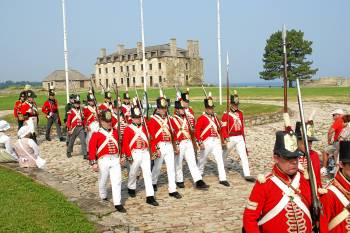The War of 1812 separated loved ones, causing anxiety for those who did not know if their loved ones would return. One couple that found the war disruptive to their relationship was British Lieutenant Maurice Nowlan and his wife Agathe. Maurice and Agathe were newlyweds who were separated by the war after only six months of marriage.
Maurice wrote that he most enjoyed being alone reading Agathe letters than amongst the jovial society functions. Although Maurice longed for his wife, he firmly believed that a military camp was no place for a woman. Agathe was desperate for letters from Maurice and complained that she did not hear from him as much as she liked.
 |
| British soldiers at Fort Niagara |
On December 10, 1813, Lieutenant Nowlan was about to take part in the night attack on
My dearest jewel don’t torture yourself with grief if you should chance to get this before I have time to write you again. Hope for the best, my only Heart. You know you are my only care, it’s but for you I live, may the Almighty bless you, my only wife.
Sadly, Maurice was killed in action during the attack. There is no record of how Agathe coped with her husband’s death but she could take small comfort in knowing that she was loved by a devoted and brave officer.


